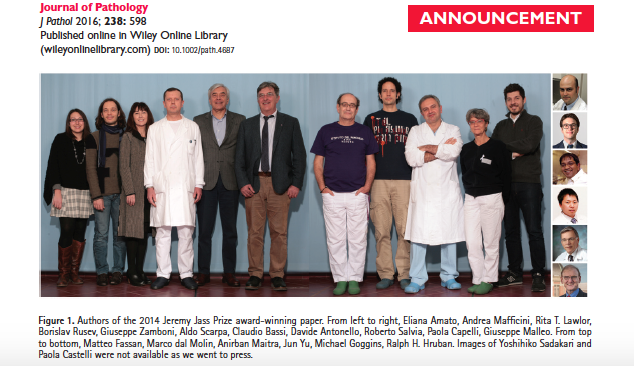A study on IPMN molecular profile conducted in Verona was awarded the Jeremy Jass Prize for Research Excellence
A collaborative study between the University of Verona (ARC-NET and the Pancreas Institute) and the Johns Hopkins University was awarded the Jeremy Jass Prize for research exellence in Pathology. The prize is awarded the a paper published in the Journal of Pathology – in the prior calendar year – that was perceived as being of the highest scientific calibre.
The study shed new light into the molecular profile of intraductal papillary mucinous neoplasms (IPMNs) of the pancreas: 52 surgically resected neoplasms were subjected to the mutation assessment of 51 cancer-associated genes, using Ion Torrent semiconductor-based next-generation sequencing. In a subset of cases, the same analysis was replicated in cyst fluids harvested from pancreatectomy specimens. The analysis showed that gastric and intestinal IPMNs commonly harbour GNAS and KRAS gene mutations. Mutations in other genes were generally more common in higher-grade lesions. In particular, TP53 gene mutations were only found in higher-grade lesions, suggesting that TP53 could be a specific marker for high-grade dysplasia or invasive IPMNs.
Furthermore, next-generation sequencing of cyst fluid samples was able to identify the majority of mutations arising in IPMNs, potentially improving the diagnostic and prognostic stratification before surgical resection.
For further information see: Amato E, dal Molin M, Mafficini A, Yu J, Malleo G, Rusev B, Fassan M, Antonello D, Sadakari Y, Castelli P, Zamboni G, Maitra A, Salvia R, Hruban RH, Bassi C, Capelli P, Lawlor RT, Goggins M, Scarpa A. Targeted next-generation sequencing of cancer genes dissects the molecular profiles of intraductal papillary neoplasms of the pancreas. J Pathol 2014; 233: 217–227, DOI:10.1002/path.4344














